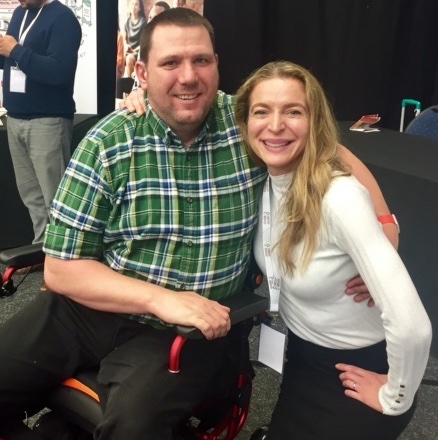 PRIME receives runner-up in Public Involvement awards
PRIME receives runner-up in Public Involvement awards
26 October 2018
The PRIME Centre Wales Patient Safety Research group were recognised as runner-up in the Health and Care Research Wales Public Involvement Award 2018, announced at the Health and Care Research Wales conference held 25th October.
Dr Andy Carson-Stevens, lead for Patient safety research at PRIME, Mr Anthony Chuter, member of the public, and team received a special mention for their submission: ‘Patient safety (PISA) research group: Improving patient safety in primary care’.
Patients are frequently harmed during the receipt of health care. Whilst the majority of healthcare consultations occur in primary care, there has been little research on how to keep patients safe in care settings like general practice. In fact, the World Health Organisation has recognised this as a major, overlooked public health burden.
The PRIME Patient Safety group is a collaboration between researchers, clinicians, patients, members of the public, policy makers, the Royal College of General Practitioners, the WHO and other national and international partnerships. Their research focuses on improving patient safety (PS) in primary care and is making a real-world difference through:
- Advancing the way that ‘patient safety incidents’ are reported and analysed at a national and international level to understand the causes of medical error;
- Guiding the NHS on where and how to improve the quality and safety of patient care;
- Training healthcare workers to recognise, report and learn from unsafe care;
- Supporting frontline healthcare professional teams to move from ‘learning to action’ by planning improvement projects;
- Building the capability of health service researchers to investigate PS and partner with organisations (e.g. WHO) to Influence national and international policy about PS.
Andy Carson-Stevens leads Patient Safety Research at PRIME Centre Wales. He works closely with a colleague, Antony Chuter, who has been a lay co-applicant on all Andy’s patient safety grants / research studies.
"Antony has a wealth of experience as a PPI representative and was awarded a Fellowship from the Royal College of General Practitioners in recognition of his work. Antony has worked with Andy for a number of years and says;
”Andy and I, since we met we clicked…that really helps… He just got everything that I said about public involvement. We invited 4 people to work on PISA and they scrutinised everything. At times there were some very challenging topics and I had to support other lay members… One of the lay members really fired up the researchers… (that it’s) really important to get this (research) out into the public. Since then Andy and I have put in a number of applications. I really love research, I really love the feeling that I’m making a difference for people now and in the future. What we are doing is really powerful. Especially the work we do in Wales with Andy about safety is so important to patients and the public and the carers”.
About another safety study with Andy, Antony said:
“We make a huge difference on the project because we reminded them (researchers/GPs) about the human behind each case and the family behind each case.... I felt that was really important”.
Andy says:
“Antony works with me and colleagues when a project is a mere acorn on the design table. During our NIHR funded PISA study, we developed a system for maximising the learning and influence of our PPI reps in advance, during and following meetings.
We were investigating really harrowing errors in healthcare and PPI reps found this quite challenging and in some cases distressing. At the outset, we held a meeting to ensure everyone was clear about what was expected from them (e.g. contributing to plans, commenting on analysis and outputs), and also to explore what they expected from me and Antony in terms of support.
As the project evolved, we revisited those discussions to check-in and ensure everyone was on the same page, that they felt they were contributing and happy to continue, and to identify any new information or learning needs.
To maximise participation, we proactively sought to identify any issues affecting each persons ability to attend or participate fully at meetings. We sought solutions to provide carer costs, implemented options for contributing to meetings in person or from home, and made sure an administrative contact was available to organise travel and help the reps complete expenses forms.
We prepared materials in a range of formats in advance of meetings including Q&A sessions online and over the telephone. The briefing and debriefings around study team meetings allowed us to work out what went well and create plans to improve their experience next time. For the PPI team to raise concerns / questions they did not feel comfortable raising with me or at meetings, Antony served as that go to person.”
The main prize was awarded to the National Centre for Mental Health (NCMH) for their pioneering work on public involvement in mental health research.
Read more about the NCMH award
